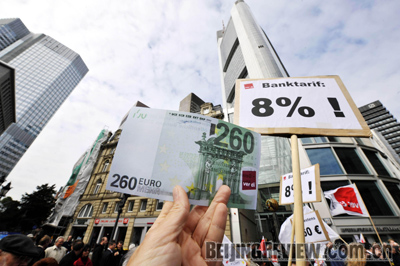|

WORKERS' PREDICAMENT: Bank employees in Europe show fake euro notes as part of their
demand for an 8-percent salary increase in response to inflationary pressure
Second, judging by the economic performances of Europe and the United States, international investment capital will probably favor the latter more, which will boost the dollar's value. When the U.S. recession started early last year, the Fed cut rates to stimulate growth. The United States will pick up growth momentum in 2010. However, when America was cutting rates, Europe kept raising interest rates and was reluctant to lower them. Therefore, the European economy will fall behind the U.S. economy.
Third, the euro is currently overvalued if we take into consideration European economic performance. Our research shows that in the long-term the euro should stand at 1.20 against the U.S. dollar, lower than the current exchange rate.
Exports to Europe
China's exports to Europe might undergo a zero-growth period next year from a 26-percent year-on-year growth this year. Our research shows that two factors will determine China's exports to Europe-Europe's economic growth and euro/renminbi exchange rate.
Each 1-percentage-point slowdown in European economic growth will result in a 7-percentage-point slowdown in China's export growth to Europe. In addition, with each 10-percent appreciation of the renminbi against the euro, China's export growth to Europe will drop 3 percentage points. This also applies to China's exports to Britain.
If we assume the euro zone's GDP growth will drop to 0.1 percent in 2009 from 1.2 percent in 2008; if the euro's exchange rate against the U.S. dollar drops to 1.35 by the end of next year from 1.59 this July; and if the renminbi/U.S. dollar exchange rate remains the same (a very conservative assumption), we estimate that China's export growth to Europe will fall to 6 percent next year from 16 percent growth this year, if goods are calculated in euros.
If goods are calculated in the U.S. dollar, according to the common practice of international trade, China's export growth to Europe will drop to around 1 percent in 2009 from 26 percent this year.
China's GDP growth
The European economic slowdown and weakening euro might lead to a 0.7-percentage-point decrease in China's GDP growth rate.
| 